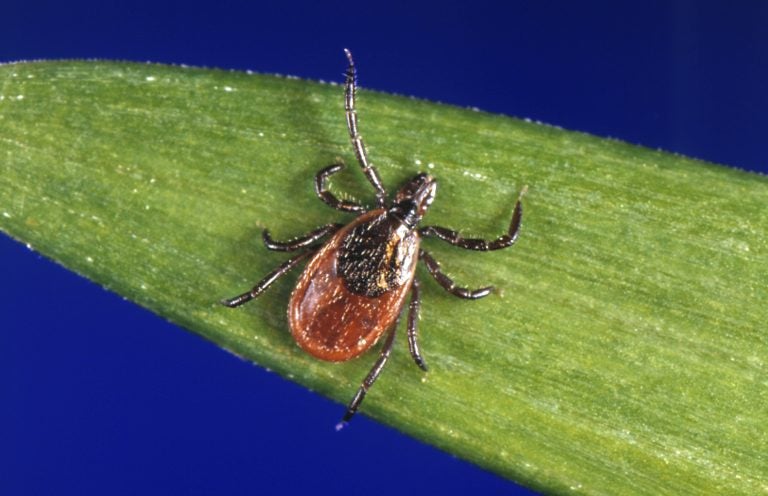Bit by a tick in New Jersey? Rutgers scientists want you to mail it in
Rutgers researchers are on a mission to recruit “citizen scientists” as part of NJ Ticks 4 Science.

In this undated file photo provided by the U.S. Centers for Disease Control and Prevention (CDC), a blacklegged tick - also known as a deer tick, rests on a plant. (CDC via AP)
Ticks love summer weather and bare skin. That’s bad news for New Jerseyians, because many of those hard-to-spot creatures carry bacteria — including the kind that transmits Lyme disease.
If you live in the Garden State and happen to find a tick on yourself or a pet, scientists at Rutgers University want you to send it to them in the mail.
“We’re trying to develop surveillance for ticks in New Jersey, which doesn’t currently exist,” said Dr. Dina Fonseca, a professor of entomology in the Center for Vector Biology at Rutgers.
The new program she leads is called New Jersey Ticks 4 Science. “Understanding what the abundance and distribution of species of concern is sort of the first step in integrated pest management,” Fonseca said.
To contribute to the project, so-called “citizen scientists” should start by taking a picture of the tick and uploading it to the NJ Ticks 4 Science website, with information about where it was found.
Fonseca then suggests storing it in a plastic bag in your refrigerator or freezer. Once Rutgers scientists confirm that the submitted photo is indeed a tick, they will follow up within 48 hours with instructions about how and where to mail it in.
Program participants will be able to see what kind of tick they submitted after Fonseca and her team have identified them. Rutgers researchers will also screen the ticks to find out what bacteria they might be carrying.
All specimens submitted will be added to a database that tracks tick distributions across New Jersey, including the incidence of over 15 tick-transmitted pathogens and parasites.
Fonseca says it’s important to know what kind of ticks are present in the area because it can help doctors run more precise tests when they’re looking for vector-borne diseases.
“If your doctor doesn’t know that this pathogen may be present, they won’t test for it,” she said.
Drexel University also has a tick collection program. The Center for Advanced Microbial Processing (CAMP) receives ticks in the mail, not only from our region, but all over the world.
“Ticks are kind of little garbage cans,” said Kayla Socarras, a Ph.D. candidate who runs the center’s tick collection program. “They really carry anything that they can get, and ticks are capable of giving human beings viruses, bacteria, or even parasites.”
Similar to the Rutgers program, Drexel asks participants to seal their ticks in a plastic container. They also have a form seeking additional information about the tick.
Socarras said that rising temperatures can lengthen tick season and change their migratory patterns.
“Because it’s so hot, they’re spreading south and out,” she said of deer (or black-legged) ticks, which transmit Lyme disease and are common in New England. “Pennsylvania, for example, is now becoming a hot spot for deer ticks. With the heat, you have a lot more movement and you have to stay vigilant for a lot longer.”
Fonseca said black-legged ticks were similarly once absent from New Jersey but are now present in all 21 counties. The lone star tick is spreading north, recovering its previous range.
Socarras said that anyone who finds a tick or a tick bite on themselves should see a doctor right away, just to be safe.
“Some of the bacteria that you can get infected with are easily treatable, and if you let them go on too long, it could become more and more of a problem,” she said. “Sometimes all you need is just the correct treatment to prevent a world of discomfort.”
To protect yourself from ticks, make sure you wear long pants and socks if you’re in a wooded area, use bug spray, and check yourself for ticks after you’ve been outside. And don’t forget to check your pets, too.
WHYY is your source for fact-based, in-depth journalism and information. As a nonprofit organization, we rely on financial support from readers like you. Please give today.






